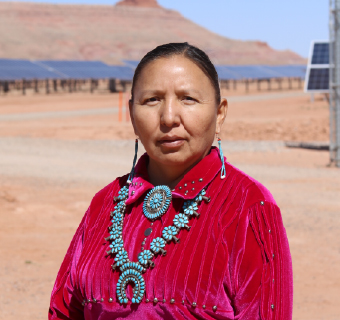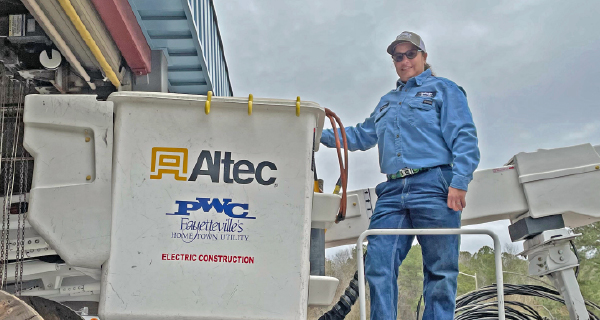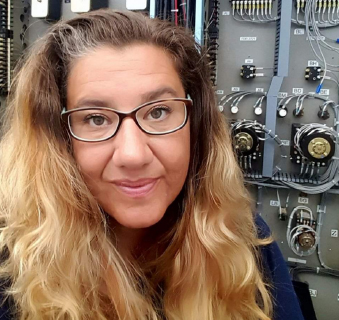Menu
Menu
March 1, 2021
by Paul Ciampoli
APPA News Director
March 1, 2021
In honor of Women’s History Month, commemorated each March, the American Public Power Association’s Public Power Current newsletter is highlighting women in the high-voltage trades who work for public power utilities across the U.S.
Among other things, the women profiled in this article detail how they made the transition to become part of public power’s community of line workers and highly technical trades, and what they would tell women who are thinking about becoming an electric utility line worker, operator, or technician.
Vircynthia Charley (Navajo Tribal Utility Authority (NTUA) in Arizona)
Vircynthia Charley got her start with NTUA learning the trade, earned her journeyman license and trained two other NTUA women journeyman, Melissa Parrish and Jasmine Yazzie.
Charley and Parrish are both leaders at NTUA’s Kayenta District Office in northern Arizona. Charley is the District Manager, while Parrish is the Field Superintendent and is the only female Field Superintendent for NTUA.
Charley said that what she enjoys most about her job and working for public power is sharing and giving back to her community.

“I understand the meaning of public power because it is all about community and working for the needs of the people. I was raised under that principle and it is a very important part of our traditional Navajo beliefs — to be prepared to give for the benefit of others,” she said.
Addressing the question of what advice she would give to other women wanting to enter the skilled, high-voltage trades, women are generally under-represented “and they shouldn’t be,” Charley said.
“My advice? Once you make the commitment to do the work, focus on doing the job well, and embrace the challenge. Always be prepared. Take the time to learn the skill and when you put your heart into your product, you will have a true sense of yourself. That’s what my parents taught me,” she said.
“On the technical side, I am an Army veteran and that’s where I learned the basics of electric work. After I was discharged, I wanted to pursue this trade. I never underestimated myself and never gave up. I kept moving forward, even learning to climb powerline poles and getting into the trenches,” she said.
“Yes, there can be setbacks but you learn from them and become a better worker. In my case, I became a journeyman but more importantly it was no longer a job or a title — it became my hand in reaching out to make a change. Soon, you will see who you are and which direction you are going.”
Charley also offered her thoughts on whether there is anything public power utilities can specifically do to support bringing more women into high-voltage trades.
She said that the right training and opportunities such as an apprenticeship program would help. “That show of support is a significant way to build trust, respect, and equality to build a successful utility, organization, and community.”
Rose Foster (South Carolina’s Santee Cooper)
Rose Foster started at Santee Cooper as a temporary worker on the line crew in 1993. When a permanent position was posted, she applied and was offered the job. She accepted the offer and her first official day on the line occurred in February 1994.
Foster, who is currently a safety specialist at Santee Cooper, noted that Santee Cooper has three classes of Line Technician: A, B and C Class.
“I progressed through our apprenticeship program as it is designed. We expect that most employees will be a C Class Line Tech for approximately 2 years and become eligible to take our progression test, if the supervisor is convinced you are ready,” she noted.
“If you pass the test, which consists of a written exam and field tasks, then you are promoted to B Class. After approximately 3 years and your supervisor believes you are ready, you test for your A Class.”
Foster spent 13 years on the line crew and had the opportunity to be Lead Line Tech for a few years. “I was also first response on stand-by. The position of Distribution Line Crew Training Instructor was posted,” and she decided to apply. “I enjoyed leading a crew and I appreciated watching new Line Techs learn and grow, so I thought the instructor job would be fun,” she noted.
She spent her time in training creating and teaching courses about distribution line work. “We host an annual Line Workers Rodeo and that was a large responsibility for our Learning and Development department.”
Foster noted that when a distribution safety specialist position was vacated, she thought that would be a natural progression for her. “Because a large portion of the topics I instructed was about safe operating procedures, I thought it would be a good transition.”
In terms of the biggest obstacles for increasing the number of women utility line workers, Foster said that one factor may be that young women don’t recognize the possibility of becoming an electric line worker.
“This career, in my experience, is so gratifying and challenging. If we could convince more young women to even consider this, they would love it as much as I do,” she said.
“I would love to have more women in this field,” Foster said.
What would Foster say to a woman who is thinking about becoming an electric utility line worker?
“Be prepared to work hard. Leave your feelings at home. Enjoy the ride, every day is a new adventure and it’s very rewarding to make people’s lives better by supplying them with reliable electricity for their homes and businesses,” she said.
Jacqueline Montero (Fayetteville Public Works Commission in North Carolina)
Jacqueline Montero is a line worker at Fayetteville Public Works Commission (PWC) in North Carolina.
Montero noted that after working at an events company in Florida for more than 10 years, she was looking for a change of pace and a job where she could have more stability and less travel.
“And I wanted to challenge myself by doing something that would challenge me mentally and physically,” she said.
After moving from Florida to North Carolina, she explored opportunities at the Fayetteville Technical Community College.
After speaking with staff at the college and reading material provided by the staff, she signed up for a basic training course for electric utility line workers.
“It sounded like a challenge and I like challenges, so I put myself to it,” Montero said.
She noted that most of the course was at a pole farm where she learned how to climb poles, how to work as a team, safety rules, how to change a line and how to put arms up.

Montero said she was surprised to learn that she was the first female to graduate from the course and that at age 38 she was able to successfully meet the physical challenges such as climbing associated with the course.
She also noted that two male classmates wound up quitting the course because they were scared of heights and didn’t want to go any higher than 10 feet. “I surprised myself that I was capable” of being able to “beat the guys on that.”
As for what daily life is like for her as a lineworker at Fayetteville PWC, Montero said that “we wake up early in the morning. We organize our trucks, our equipment and then go to the job site.”
Her team currently works as groundsmen. They are in charge of laying down all the pipes and wires for all new construction.
“It’s a great experience. I’m really grateful that they gave me the opportunity to work for them,” Montero said.
She noted that her teammates treat each other with respect and like family “because one mistake or one bad move or not paying attention,” can cost “my life or somebody else’s life,” so safety is always front of mind.
What would Montero say to a woman who is thinking about becoming an electric utility line worker?
Overall, not just as a female but also as a Latina, Montero said she would encourage the next generation of women to “go for it. It can seem challenging at times but if you focus and put your mind into it, you’ll be able to do it,” she said.
“Even if you’re not sure or just curious, to take the leap of faith like I did,” Montero said. “Just believe in yourself that you can accomplish anything that you put your mind into.”
Lisa Barbato (Colorado Springs Utilities)
As the newly named General Manager of Energy Supply at Colorado Springs Utilities, Lisa Barbato leads the overall business performance of generating facilities at the public power utility that produces approximately 1,000 megawatts of electricity from a combination of solar, coal, natural gas and hydroelectric plants, as well as the fuel acquisition for these facilities and supply of natural gas to the Colorado Springs Utilities’ system.

She is also responsible for retiring the coal-fired Martin Drake Power Plant by no later than 2023.
“Working for a public power company provides a great sense of pride when you can see how your contributions benefit your own community,” Barbato said.
In 2017 Barbato was named General Manager of the Distribution, Collection and Treatment Department at Colorado Springs Utilities.
The following year the Utilities Board named a new CEO of Colorado Springs Utilities, Aram Benyamin. One of his first actions was to institute a four-service general manager rotation program to give leaders the ability to learn how different parts of the organization operate, to expose them to different industries and to introduce them to new employees they otherwise would have never met.
Barbato was one of four general managers selected for this pilot program. She went from her role overseeing wastewater and water operations to the General Manager of Energy Supply. She had never worked in energy before and now she was one of the top energy executives at the organization.
“I was kind of excited. There were so many changes that were going to be happening on the energy side of the business and I was excited to be a part of that,” Barbato remembered, when Benyamin told her about her new position.
“With the integrated resource plan discussion and retiring of the coal power plants, it all seemed a little daunting. But I was ready to make a difference and leave a legacy with the future of energy in this organization,” she said.
After the general manager rotation program ended in June 2020, she competed for the job and was named the first female General Manager of Energy Supply for Colorado Springs Utilities in July 2020.
Barbato oversees 250 employees. She focuses on energy policy development, is responsible for understanding the fuels and commodity markets, engaging new technologies, driving innovation toward the delivery of reliable energy solutions and demonstrating expertise in the area of North American Electric Reliability Corporation regulatory compliance.
When asked what advice she has for other women wanting to enter the skilled/technical trades, Barbato said, “Don’t be afraid of being uncomfortable. You may think you cannot do things, but you are very capable and more than qualified.”
She added, “Don’t be afraid to choose a path less traveled than others in your demographics. You will find that you will be valued and add a diverse perspective.”
Sheri Rice (Seattle City Light)
Sheri Rice has been with Seattle City Light for 23 years. She started as a flagger and has since completed two apprenticeships, one as a utility construction worker and the other as an electrician constructor for substations. Between those apprenticeships she worked as a material supplier for line crews.
She has been a constructor for the last 16 years.

When asked what she enjoys most about her job and working for public power, Rice said “The variety. I think people underestimate the opportunities working for a public utility. I really enjoy keeping the public’s lights on. There is a sense a pride in solving the problems and getting people in power during and after storms.”
She said that the equipment “is constantly changing and advancing which means we as journeymen are constantly learning.”
As for what advice Rice has for other women wanting to enter the skilled, high-voltage trades, she said that apprenticeships are the best path. “If you want to learn, earn college credit, make a stable livable wage with benefits and retirement it is the way to go,” she said.
“Do your research, find out which aspect of the High voltage trades interests you. If there is an opportunity to work as a helper on the crews apply, get your feet wet. There are all kinds of free guides on training, study guides and pre-tests to check aptitude online, take them and use them,” Rice said.
“Don’t underestimate yourself. Don’t be intimidated by the physical aspects of these jobs. You will learn how to use your body mechanics on how to get the job done.”
Rice also said that public power utilities can do a number of things to support bringing more women in to high-voltage trades.
“Publications like this help. Going out to high schools, job fairs and outreach programs. Start talking to your daughters, nieces and neighbors,” she said.
“Apprenticeships need to be presented alongside college opportunities. Women need to understand the opportunities of these careers and that they are completely capable of being successful in them.”
Copyright © 2024 Kansas Power Pool | Designed by Custom Internet Services LLC